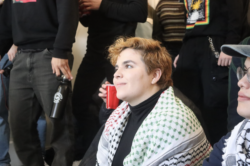A summit to find more space for students on campus was held on Tuesday, October 27. Members of the Student Space Working Group, Vice President for Student Affairs Todd Olson, and Georgetown administrators met to discuss plans for reorganizing existing student space and creating new student space on campus buildings like New South Hall.
The SSWG, created in 2008, hopes to create more study spaces, social areas, club offices, and a central student union in Georgetown.
“Plans have been written up for a New South Student Center. There’s approximately 30,000 square feet of space under New South, which is largely unused,” Chair of the SSWG Max Glassie (COL `10) said.
The extensive plans include a conference center and a restaurant or café.
The administration and the SSWG also discussed immediate renovations on the Leavey Center, such as furniture improvements and better bulletin board space. In light of the increased traffic through the Leavey Cetner resulting from the new Hariri building, Olson advocated “remaining thoughtful about the use of space in the Leavey Center” especially in light of the new traffic brought by the Hariri building, and eventually, the new science building. Long-term plans may include the construction of new student space above the bookstore.
Armed with information from the Spring 2009 survey that 1,137 students took part in, the SSWG is planning to finalize the “White Paper,” a proposal plan for student spaces.
The group will conduct more qualitative research with student leaders on campus to better gauge what the student body needs, according to SSWG Communications Director Fitz Lufkin (COL ’11). SSWG will also try to elicit student feedback in a forum or town hall meeting in the near future.
After the “White Paper” is finished, SSWG hopes to construct a concrete design plan, but progress on the design has so far been held back due to funding concerns. According to Glassie, SSWG’s initiatives have been placed on a priority list in Georgetown’s upcoming Capital Campaign.
“Right now, there is no definite plan,” Lufkin said.
The SSWG is also launching an initiative to better inform students about existing lounges and facilities, in addition to looking at the registration process student organizations have to go through to reserve a space.
“Space is something that moves very slowly,” Glassie said. “A lot of it is talk, and at this point we have to realize that talk is a really good thing and it means a lot of progress.”




